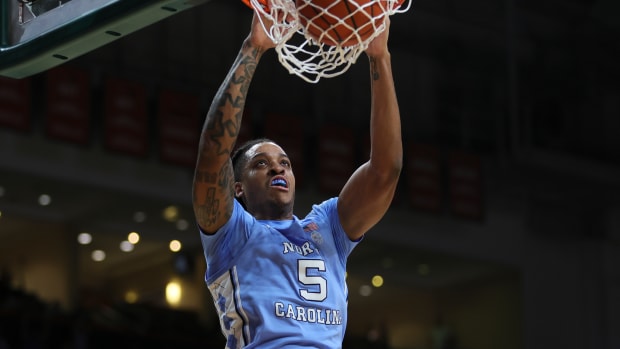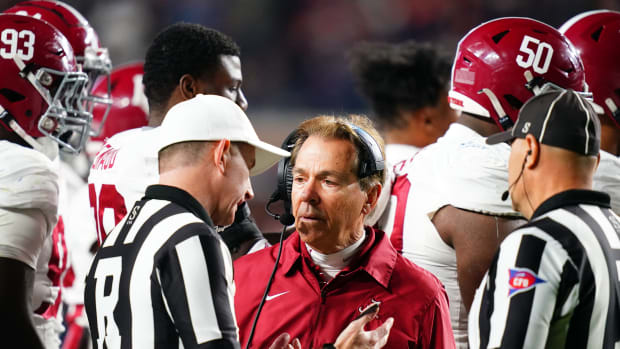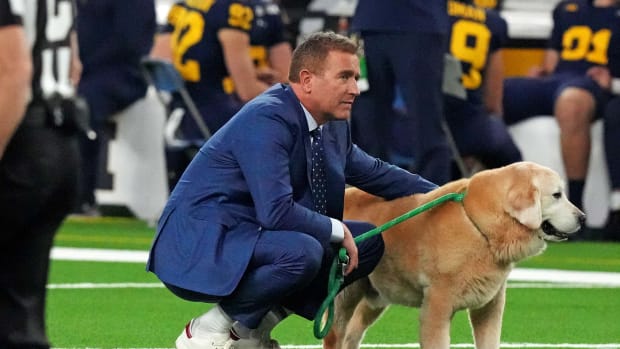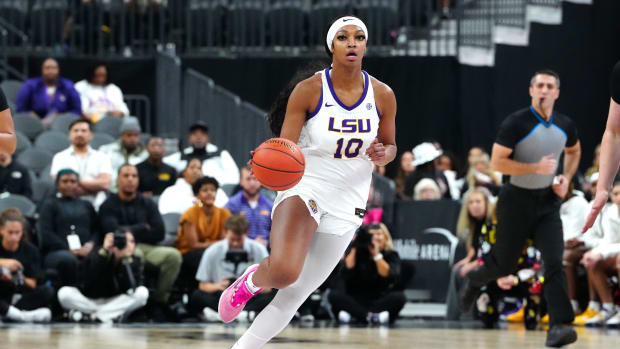
Michigan State Alum Launches Campaign for Mady Sissoko's Foundation to Help Home Village
Mady Sissoko may very well be the most selfless man in college basketball; it is even more likely that he has made more of a positive global impact than any player in the country. Currently a solid contributor to the Michigan State basketball program under head coach Tom Izzo, Sissoko’s life has not always looked as glamorous as it does now as a Big Ten basketball player.
Saying Sissoko’s journey started from humble beginnings would be quite an understatement. Growing up in the small West African village of Tangafoya, Mali, Sissoko walked over an hour just to get to school, sometimes without shoes. Education, after all, was considered a luxury for those in his position.
At the age of fifteen, Sissoko’s life changed. During downtime on a mission trip to provide medical care in Mali, Mike Clayton, a mission trip organizer, and Paul Olson, an ophthalmologist, went to watch basketball at a court near the compound where they were being housed. It was there that he was approached by two men on a single motorcycle – Mady and his older brother, Souliymane. The brothers drove hours to the court for Souliymane to insist that mission trip organizers watch the then-fifteen-year-old Mady Sissoko play.
Immediately, his impressive frame and natural athleticism were noticed. Knowing his talents needed to be developed, the duo worked to get Sissoko enrolled at Wasatch Academy in Mount Pleasant, Utah. After an impressive prep career, Sissoko headed to East Lansing to join the storied Spartan basketball tradition.
In 2021, Sissoko’s sophomore season, a seismic shift in NCAA policy occurred – NIL. For the first time, student-athletes could receive monetary compensation for their Name, Image, and Likeness (NIL); the new policy granted student-athletes the same control over their publicity rights as anyone else.
For Sissoko, this policy change was not as simple as it was for many of his teammates. The vast majority of international student-athletes establish legal residency in the U.S. through F-1 student visas. With this limited legal status in America – and the reluctance of the Department of Homeland Security to make accommodations for student-athletes – NIL opportunities for international players are slim to none, as it violates a condition of their student visa that does not allow "off-campus employment."
Even though Sissoko could not benefit from his NIL in the same way as his teammates, he was not discouraged in his efforts. Instead, he focused on what he could do rather than what he couldn’t do. While U.S. immigration policy wouldn’t allow him to benefit directly from the NCAA’s new policy, he could leverage the new guidelines to create a charitable foundation in his name – another restriction on student-athletes lifted by NIL in 2021.
Sissoko and his team created the Mady Sissoko Foundation: a 501(c)(3) charity to build a school in his local village. During his first fundraising round, Sissoko was able to leverage the generosity of Spartans to raise over $50,000.
Using the initial funding, the foundation, in the summer of 2023, opened a school in Sissoko’s name in Tangafoya. Children in Mady’s village no longer have to share in his experience of walking over an hour each way to receive an education. Currently, at The Mady Sissoko Foundation School at Tangafoya, there are four rooms that can each hold roughly fifty students. In addition to the classrooms, Mady’s school has basketball hoops and soccer goals for children to sharpen their athletic acumen.
Mady leveraged his charisma and basketball prowess to make his vision of a better village a reality. In an interview with The Detroit News, Sissoko shared that his passion for this project is fueled by the notion of a brighter future for younger generations: “We gotta make sure a kid or little brothers have a different perspective than what we did.” In discussions with longtime friends, Sissoko realizes the positive power his school would have had for those he grew up with, “we wish we had a school here like that. We’d all be a great student.”
On top of his gift of accessible education, Sissoko’s foundation was also able to deliver a well that provided his community with its first clean running water system. Access to clean water, while something often taken for granted in the U.S., is imperative to improving health outcomes and preventing illness. The average life expectancy in Mali is under 59 years old; providing this resource is paramount to the well-being of people in his community. The impact Sissoko has already made is undeniable.
When asked about Sissoko in an interview with MSU reporters, Izzo said, “I don't think he realizes what an impact he's had. Which makes the story even cooler. He didn't do it for you guys (the media) to be here, or me to be here - get pats on the back. He did it because he's got people back there that are trying to do what he did.”
Now, at the outset of Big Ten conference play, Michigan State alumni have once again set out to help one of their own. A GoFundMe has been created to donate money to the Mady Sissoko Foundation, helping Sissoko to expand upon the work already being done. The initiative has an ambitious goal of $200,000; if realized, this money would make a momentous impact on the entire community of Tangafoya.
According to the GoFundMe, which can be accessed here, the money donated will enable the Mady Sissoko Foundation to provide for the community in the form of:
1) Critical educational needs: hiring teachers for four years and supporting up to 400 Tangafoya schoolchildren (1st through 6th) with school supplies, construction of a hut for the housing of the teachers, construction of a permanent concrete playground equipped with basketball goals, tetherball, four square, etc. Soccer goals will also be installed.
2) Community development support for food and power: solar power installation providing access to a power grid, power lines to the school and each village hut, and an electric grain grinder/blender for the corn, wheat and other grains that villagers must now grind by hand for subsistence and trade. A 40-foot shipping container will be purchased to allow easier and less expensive shipping of materials from the U.S.A. to Mali.
3) A flight of compassion for Mady’s brother Soulemayne to attend two of his senior-year basketball games this February, 2024. No one from his family has seen Mady play in person.
This GoFundMe initiative was started by Jim Gray, a Spartan alumni who has never met Mady in person. Over the summer, Gray was made aware of Mady’s story; after learning of the philanthropy, Gray was so moved that he felt a calling to help Sissoko fulfill his vision for his community in Tangafoya.
After discussions with Sissoko’s guardian Mike Clayton, Gray realized that while the school is functioning, there is still much more that can be done to improve the robustness of its offerings. This new capital injection will implement resources such as permanent teachers, more reliable electricity, and enhanced technological offerings. After 72 hours, the GoFundMe has raised $7,000 of its $200,000 goal.
It is important to Gray that Sissoko is able to have his brother, Soulyimane, see him play in person. Soulyimane, currently in the Mali military, was the one who drove hours on a motorcycle with Mady to get the attention of the Americans. Hopefully, through this initiative, he will be able to see the Spartans and his brother compete against Big Ten opponents, a fitting testament to the sacrifices he made for his little brother years ago.
When discussing NIL at large, Gray stated that a man who “takes his NIL to build a school and build a well are the people we need to help.” While many fixate on NIL’s alleged degradation of college athletics, it is important to use Mady’s story as a moment of perspective. Without NIL, this foundation would not exist. Through the power of college sports, NIL, and Sissoko’s altruism, children living 5000 miles away from Michigan State will, for the first time, be offered an education, clean water to drink, and a brighter future.





